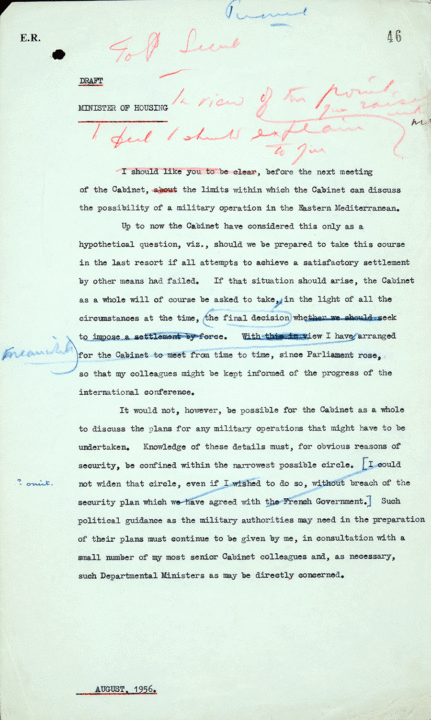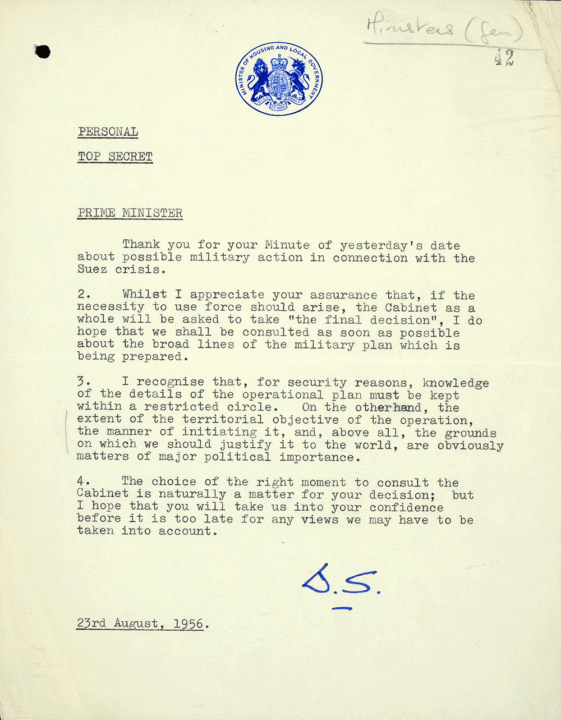
Prime Minister’s Office: Correspondence between Anthony Eden and Duncan Sandys about the Suez Crisis, 1956
We hope you enjoyed watching our Education Service video with Contemporary Records Specialist Mark Dunton looking at twentieth century records from the Prime Minister’s Office relating to the start of the Suez Crisis in 1956.
Egyptian President Nasser announced the nationalisation, or taking into public control, of the Suez Canal Company on July 26, 1956. The Suez Canal had been built and operated by the British and French since 1869. It connected the Mediterranean and Red Sea. Europe depended on the canal for shipping oil from the Middle East and Britain as a route to their former empire in the East. The nationalisation was Egypt’s response to the USA’s decision to withdraw funding for the new Aswan Dam across the Nile. However, Arab nationalism was an important factor in the decision – control of the canal would reduce western influence and benefit Egypt’s economy. Find out more about the context and events that followed.
Download Spotlight On: Suez Crisis Resource Pack
Now try and answer the following questions:
- What is the role of the Prime Minister’s Office?
- When was it formed?
- What type of sources can we find in the PREM collections?
- How do these collections compare to the Cabinet office records?
- What do the PREM records reveal about the role of the Prime Minister?
- What makes PREM collections valuable for historians?
- What does the file in this video reveal about the British government‘s reaction to the Suez crisis?
Document 1
Extract from a draft minute from Prime Minister Anthony Eden (written by Cabinet Secretary, Norman Brooke) to Duncan Sandys, Minister of Housing and Local Government. Sandys had commented on the lack of information made to the wider Cabinet on the question of using military force in reaction to President Nasser’s decision to nationalise the canal. Catalogue ref: PREM 11/1125.
It is our understanding that the comments written in red were written by an official, presumably dictated by the Prime Minister. The word ‘omit?’ in blue was written by Cabinet Secretary, Norman Brooke.
Transcript
E.R.
Personal (Blue text)
Go to [Private Secretary] (Red text)
*In view of the point, you raised with me, I feel I should explain to you (Red text)
DRAFT
MINISTER OF HOUSING
*I should like you to be clear before the next meeting of the Cabinet, about the limits within which the Cabinet can discuss the possibility of military operation in the Eastern Mediterranean.
Up to now the Cabinet have considered this only as a hypothetical question, viz., should we be prepared to take this course in the last resort if all attempts to achieve a satisfactory settlement by other means had failed. If that situation should arise, the Cabinet as a whole will of course be asked to take, (the final decision) in the light of all the circumstances at the time, whether we should seek to impose a settlement by force. With this view I have arranged (meanwhile) for the Cabinet to meet from time to time, since Parliament rose, so that my colleagues might be kept informed of the progress of the international conference.
It would not, however, be possible for the Cabinet as a whole to discuss the plans for any military operations that might have to be undertaken. Knowledge of these details must, for obvious reasons of security, be confined within the narrowest possible circle. [ I could not the circle, even if I wished to do so, without breach of the security plan which we have agreed with the French Government.]** Such political guidance as the military authorities may need in the preparation of their plans must continue to be given by me, in consultation with a small number of my most senior Cabinet colleagues and, as necessary, such Departmental Ministers as may be directly concerned.
** Omit? [Norman Brooke’s suggested deletion in blue ink]
AUGUST 1956
Document 2
Letter from Duncan Sandys to Prime Minister Anthony Eden in reply to the Prime Minister’s minute about possible military action after Nasser’s decision to the nationalise of the Suez Canal.
Duncan Sandys (pronounced Sands) was first elected to the House of Commons in 1935. He returned to the House of Commons when the Conservatives regained power in 1950 and became Minister of Supply in 1951 then later Minister of Housing and Local Government from 1954.
- Why do you think letter is labelled ‘Personal’ and ’Top Secret’?
- Why has Sandys written to the Prime Minister?
- What hope does he express in the final paragraph of the letter?
- What is the significance of this letter?
- What does this source reveal about the value of the PREM collection to historians of these events?
- What other sources could you explore relating to the Suez Crisis?
Transcript
PERSONAL
TOP SECRET
PRIME MINISTER
Thank you for your Minute of yesterday’s date about the possible military action in connection with the Suez crisis.
- Whilst I appreciate your assurance that, if the necessity to use force should arise, the Cabinet as a whole will be asked to take ‘the final decision’, I do hope that we shall be consulted as soon as possible about the broad lines of the military plan which is being prepared.
3.I recognise that, for security reasons, knowledge of the details of the operational plan must be kept within a restricted circle. On the other hand, the extent of the territorial objective of the operation, the manner of initiating it, and, above all, the grounds on which we should justify it to the world, are obviously matters of major political importance.
- 4. The choice of the right moment to consult the Cabinet is naturally a matter for your decision; but I hope that you will take us into your confidence before it its too late for any views we may have to be taken into account.
D.S. [Duncan Sands]
23rd August, 1956
Extension activity
Take a look at three other original sources available in the 1950s Britain themed collection of documents. What do these sources reveal about the Suez crisis?
- Article and illustration entitled: ‘The Government are prepared to embark on a policy of abject appeasement: Sir Anthony Eden concluding his historic statement of policy on Suez’ from The Illustrated London News, 22 September 1956, Catalogue ref: ZPER 34/208.
- An article and photograph from the News Chronicle dated 5 November 1956, Catalogue ref: FO 371/118922. The News Chronicle was a British daily newspaper which ceased publication in October 1960 being absorbed into the Daily Mail. This article forms part of a collection of material described by the Foreign Office as ‘samples of propaganda being put out by the Egyptians.’
- Extract from a report dated 11 October 1957 by General Charles Keightley on Suez operations in the Eastern Mediterranean, November-December 1956 Catalogue ref: AIR 8/1940
Connections to curriculum
Key stage 3
Challenges for Britain, Europe, and the wider world 1901 to the present day; Britain’s place in the world since 1945.
Key stage 4
Edexcel GCSE: Conflict in the Middle East, 1945–95: The events and significance of the Suez Crisis (1956)
Key stage 5
AQA GCE British Political History: The Making of Modern Britain, 1951–2007. Foreign relations: Suez.
OCR GCE Britain 1951–1997: Conservative domination 1951–1964: Eden; Britain’s position in the world 1951–1997: Suez
The Middle East 1908–2011: Ottomans to Arab Spring : Nasserism 1952–1970: relations with Britain, France, the US and the USSR; the Suez Crisis 1956.
External links
Imperial War Museum with further sources on the importance of the Suez Crisis
Government blog on the context of the Suez Crisis

